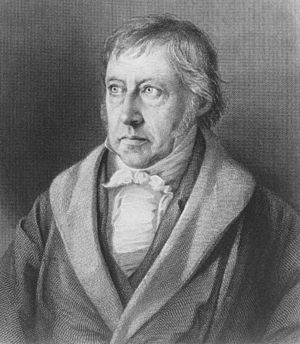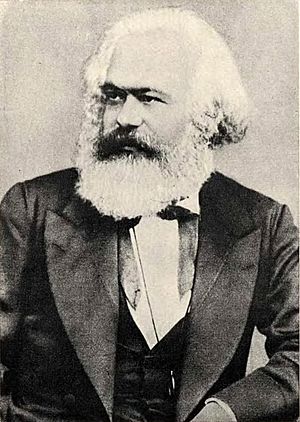Philosophy of history facts for kids
Philosophy of history is about thinking deeply about history itself. It's not just about what happened in the past, but about why it happened, what it means, and how we understand it.
Imagine history as a huge puzzle. The philosophy of history asks: What kind of puzzle is it? Does it have a hidden message? Are some pieces more important than others?
There are two main ways to look at it:
- Speculative philosophy of history tries to find a big meaning or purpose in all of history. It asks if history is going somewhere, like towards a goal or a specific future.
- Critical philosophy of history (also called analytic) looks at how historians actually study the past. It asks how we know what we know about history, how reliable our sources are, and if historians can ever be truly neutral.
Contents
How History Thinking Started
People have always thought about history.
Early Ideas
Long ago, in ancient Greece, thinkers like Aristotle believed that poetry was better than history. He thought poetry showed what should be true, while history only showed what was true.
Herodotus, another Greek from around 400 BCE, is sometimes called the first real historian. He tried to investigate past events. He and later historians like Plutarch often made up speeches for historical figures. They also chose stories that would teach readers good lessons or improve their character. History was seen as a way to learn from the past and become a better person.
For a long time, historians would either focus on teaching good morals or on just stating facts. They wrote about kings or heroes, like in the famous story of The Song of Roland.
A New Way to Think About History
In the 1300s, a thinker named Ibn Khaldun from North Africa wrote a lot about history and society in his book Muqaddimah. He is seen as one of the first to develop the philosophy of history. He didn't just accept old stories; he often criticized "idle superstition" and wanted to use a more scientific approach. He called his method a "new science" for understanding history. He also looked at how governments, communication, and even propaganda played a role in shaping history.
By the 1700s, historians tried to be more factual. But they still wanted history to teach and improve people. Later, in the 1800s, historians like Fustel de Coulanges and Theodor Mommsen made history studies more scientific. During the Victorian era, people started debating less about whether history should teach lessons, and more about what causes historical change.
Big Ideas in History
History and Time
Many ancient cultures didn't see time as a straight line. They thought history moved in cycles, like seasons. They believed in alternating "Dark Ages" and "Golden Ages."
- The Greek philosopher Plato talked about a "Great Year."
- Hesiod described five "Ages of Man": Golden, Silver, Bronze, Heroic, and Iron. These cycles are similar to ideas in ancient India, like the Yuga Cycle.
- Jainism teaches that the world constantly goes through cycles of improvement and decline.
In the East, China had ideas about "dynastic cycles," where ruling families would rise and fall. Ibn Khaldun also wrote about cyclical theories of history.
During the Renaissance, people again thought about history in cycles, seeing empires rise and fall, like the Roman Empire.
But during the Age of Enlightenment (the 1700s), people started seeing history as a straight line, always moving forward and never going back. They believed in "social progress," meaning that humanity was always improving. Thinkers like Condorcet and Auguste Comte believed that humans could become perfect through education and progress.
However, cyclical ideas didn't completely disappear. In the 1900s, writers like Oswald Spengler still saw history as a series of repeated rises and falls. After the terrible First World War, many people questioned the idea of constant progress.
What Causes Things to Happen?
Historians often try to figure out the causes of events. Sometimes, they look at single actions, and other times, they look at bigger trends or groups of actions.
For example, when thinking about why the atomic bomb was dropped on Hiroshima, the immediate cause was President Truman's order. But there were also many other factors leading up to that decision.
Some people believe that history is "deterministic," meaning that certain things like geography, economic systems, or culture force events to happen in a specific way. Others see history as a chain of events where each one influences the next. Even those who believe in determinism agree that rare, huge events like wars can change history's course, but they think these changes are often temporary.
Is History Neutral?
A big question is whether history can ever be truly neutral or unbiased. One common idea is that "history is written by the victors." This means that the winners of a conflict often control the story, making their side look good and the losing side look bad.
Michel Foucault suggested that the winners use their power to hide the losers' version of events. But others argue that defeat can actually make people more creative and lead them to reinvent themselves, while winners might become less creative.
For a long time, people thought history should judge people and their actions. But since the 1900s, most Western historians try not to judge historical figures. They believe their job is to understand what happened, not to say who was right or wrong.
Historians also debate if they should express their own opinions. Many believe that being neutral and objective is important, while others argue that complete neutrality is impossible.
Different Ways to Understand History
History with a Purpose (Teleology)
Some theories see history as having a "teleological" purpose, meaning it's moving towards a specific goal or end. Early ideas like this came from religious beliefs, trying to explain why bad things happen if God is good. They saw history as part of a bigger plan, leading to a final outcome like a "Messianic Age."
G. W. F. Hegel, a famous German philosopher, had a very influential teleological view. He believed history was a process where "reason" or "spirit" became more and more real through conflicts and resolutions. He thought that history was moving humanity towards a more civilized state.
However, other thinkers like Nietzsche and Michel Foucault disagreed. They argued that history doesn't have a single purpose or direction. They saw it as full of sudden changes and breaks, not a smooth, continuous path.
Great People in History

After Hegel, Thomas Carlyle argued that history is mostly about the lives of a few important individuals, or "heroes." He said, "The History of the world is but the Biography of great men." He believed these great men—whether political leaders, artists, or thinkers—were the main drivers of change.
However, this "Great Man Theory" became less popular later on. After Karl Marx suggested that economic and social factors were more important, people started looking at history with a wider view. Herbert Spencer pointed out that great people don't just appear out of nowhere; society itself creates the conditions for them to emerge.
How Societies Evolve
Inspired by the idea of progress from the Enlightenment, "social evolutionism" became popular in the 1800s.
Auguste Comte believed history moved through three stages: 1. Theological stage: People explain things through religion. 2. Metaphysical stage: People explain things through abstract ideas. 3. Positivist stage: People explain things through science.
This idea suggested that societies start simple and gradually become more civilized, often seeing Western civilization as the most advanced.
When Charles Darwin published his book on evolution in 1859, his ideas were quickly applied to human societies. This led to "social Darwinism," which suggested that societies, like living things, compete, and only the "fittest" survive and thrive.
However, after the horrors of the First World War, many people questioned the idea of constant progress. The war made them realize that civilizations could fall apart.
Still, the idea of progress didn't completely disappear. In 1992, Francis Fukuyama suggested that the spread of liberal democracy might be the "End of History," meaning that humanity had reached its final political system.
History and Its Surroundings
Since the 1700s, some philosophers started looking at how things like geography, economics, and population changes affect history.
The Annales School, founded in 1929, was a big step in this direction. Instead of focusing only on famous individuals, they studied how larger social forces shaped history. For example, they looked at how the Mediterranean Sea influenced history or how climate changes affected societies.
Karl Marx's View

Karl Marx is famous for his idea that economic systems are the most important factor in history. He believed that things like religion, culture, and politics were mostly shaped by the underlying economic system.
However, Marx also said that history isn't completely fixed. He famously wrote: "Men make their own history, but they do not make it just as they please; they do not make it under circumstances chosen by themselves, but under given circumstances directly encountered and inherited from the past." This means people create history, but they do so within the conditions they are born into.
Michel Foucault's View
Michel Foucault explored how truth in history can be a result of power struggles. He looked at how different groups, like the nobility or the common people, used their own versions of history as a political tool. For example, some French nobles claimed they were descended from invaders and had a right to rule.
Foucault showed that history, which used to be about the glorious deeds of rulers, became a tool for ordinary people. He argued that truth is not always absolute; it can be shaped by conflicts and power.
Storytelling in History
Some thinkers believe that storytelling, or "narrative," is very important in history. They argue that to understand past events, we need to put them into a story. This helps us connect different events and see their meaning.
Even though history is about facts and fiction is made up, many modern historians still think that telling a good story is crucial for making history understandable and engaging. They believe that narratives help us make sense of the complex "temporal experience" of the past.
History, Learning, and Messages
Since ancient times, people have known that education and history are powerful tools for shaping a group's identity. Because of this, history can sometimes be used for propaganda, where people try to change or hide parts of the past to fit their own agenda.
The idea of public education, especially during the Enlightenment, was seen as a way to help people become more independent thinkers.
Modern education systems often use history textbooks to teach a common national story. For example, a classic French textbook from the late 1800s told the story of two children traveling through France, learning about their country's diversity and building a shared national identity.
See also
 In Spanish: Filosofía de la historia para niños
In Spanish: Filosofía de la historia para niños
- Historical significance
- Historiography
- Philosophy of time
- Political philosophy
- Social philosophy
- Truth
 | Lonnie Johnson |
 | Granville Woods |
 | Lewis Howard Latimer |
 | James West |

